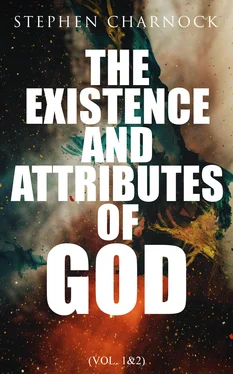Stephen Charnock - The Existence and Attributes of God (Vol. 1&2)
Здесь есть возможность читать онлайн «Stephen Charnock - The Existence and Attributes of God (Vol. 1&2)» — ознакомительный отрывок электронной книги совершенно бесплатно, а после прочтения отрывка купить полную версию. В некоторых случаях можно слушать аудио, скачать через торрент в формате fb2 и присутствует краткое содержание. Жанр: unrecognised, на английском языке. Описание произведения, (предисловие) а так же отзывы посетителей доступны на портале библиотеки ЛибКат.
- Название:The Existence and Attributes of God (Vol. 1&2)
- Автор:
- Жанр:
- Год:неизвестен
- ISBN:нет данных
- Рейтинг книги:3 / 5. Голосов: 1
-
Избранное:Добавить в избранное
- Отзывы:
-
Ваша оценка:
- 60
- 1
- 2
- 3
- 4
- 5
The Existence and Attributes of God (Vol. 1&2): краткое содержание, описание и аннотация
Предлагаем к чтению аннотацию, описание, краткое содержание или предисловие (зависит от того, что написал сам автор книги «The Existence and Attributes of God (Vol. 1&2)»). Если вы не нашли необходимую информацию о книге — напишите в комментариях, мы постараемся отыскать её.
The Existence and Attributes of God (Vol. 1&2) — читать онлайн ознакомительный отрывок
Ниже представлен текст книги, разбитый по страницам. Система сохранения места последней прочитанной страницы, позволяет с удобством читать онлайн бесплатно книгу «The Existence and Attributes of God (Vol. 1&2)», без необходимости каждый раз заново искать на чём Вы остановились. Поставьте закладку, и сможете в любой момент перейти на страницу, на которой закончили чтение.
Интервал:
Закладка:
2. Let us be sensible of it in others. We ought to have a just execration of the too open iniquity in the midst of us; and imitate holy David, whose tears plentifully gushed out, “because men kept not God’s law.” 305And is it not a time to exercise this pious lamentation? Hath the wicked atheism of any age been greater, or can you find worse in hell, than we may hear of and behold on earth? How is the excellent Majesty of God adored by the angels in heaven, despised and reproached by men on earth, as if his name were published to be matter of their sport! What a gasping thing is a natural sense of God among men in the world! Is not the law of God, accompanied with such dreadful threatenings and curses, made light of, as if men would place their honor in being above or beyond any sense of that glorious Majesty? How many wallow in pleasures, as if they had been made men only to turn brutes, and their souls given them only for salt, to keep their bodies from putrefying? It is as well a part of atheism not to be sensible of the abuses of God’s name and laws by others, as to violate them ourselves: what is the language of a stupid senselessness of them, but that there is no God in the world whose glory is worth a vindication, and deserves our regards? That we may be sensible of the unworthiness of neglecting God as our rule and end, consider,
1. The unreasonableness of it as it concerns God.
1st. It is a high contempt of God. It is an inverting the order of things; a making God the highest to become the lowest; and self the lowest to become the highest: to be guided by every base companion, some idle vanity, some carnal interest, is to acknowledge an excellency abounding in them which is wanting in God; an equity in their orders, and none in God’s precepts; a goodness in their promises, and a falsity in God’s; as if infinite excellency were a mere vanity, and to act for God were the debasement of our reason; to act for self or some pitiful creature, or sordid lust, were the glory and advancement of it. To prefer any one sin before the honor of God, is as if that sin had been our creator and benefactor, as if it were the original cause of our being and support. Do not men pay as great a homage to that as they do to God? Do not their minds eagerly pursue it? Are not the revolvings of it, in their fancies, as delightful to them as the remembrance of God to a holy soul? Do any obey the commands of God with more readiness than they do the orders of their base affections? Did Peter leap more readily into the sea to meet his Master, than many into the jaws of hell to meet their Dalilahs? How cheerfully did the Israelites part with their ornaments for the sake of an idol, who would not have spared a moiety for the honor of their Deliverer! 306If to make God our end is the principal duty in nature, then to make ourselves, or anything else, our end, is the greatest vice in the rank of evils.
2d. It is a contempt of God as the most amiable object. God is infinitely excellent and desirable (Zech. ix. 17): “How great is his goodness, and how great is his beauty!” There is nothing in him but what may ravish our affections; none that knows him but finds attractives to keep them with him; He hath nothing in him which can be a proper object of contempt, no defects or shadow of evil; there is infinite excellency to charm us, and infinite goodness to allure us,—the Author of our being, the Benefactor of our lives. Why then should man, which is his image, be so base as to slight the beautiful Original which stamped it on him? He is the most lovely object; therefore to be studied, therefore to be honored, therefore to be followed. In regard of his perfection he hath the highest right to our thoughts. All other beings were eminently contained in his essence, and were produced by his infinite power. The creature hath nothing but what it hath from God. And is it not unworthy to prefer the copy before the original—to fall in love with a picture, instead of the beauty it represents? The creature which we advance to be our rule and end, can no more report to us the true amiableness of God, than a few colors mixed and suited together upon a piece of cloth, can the moral and intellectual loveliness of the soul of man. To contemn God one moment is more base than if all creatures were contemned by us forever; because the excellency of creatures is, to God, like that of a drop to the sea, or a spark to the glory of unconceivable millions of suns. As much as the excellency of God is above our conceptions, so much doth the debasing of him admit of unexpressible aggravations.
2. Consider the ingratitude in it. That we should resist that God with our hearts who made us the work of his hands, and count him as nothing, from whom we derive all the good that we are or have. There is no contempt of man but steps in here to aggravate our slighting of God; because there is no relation one man can stand in to another, wherein God doth not more highly appear to man. If we abhor the unworthy carriage of a child to a tender father, a servant to an indulgent master, a man to his obliging friend, why do men daily act that toward God which they cannot speak of without abhorrency, if acted by another against man? Is God a being less to be regarded than man, and more worthy of contempt than a creature?—“It would be strange if a benefactor should live in the same town, in the same house with us, and we never exchange a word with him; yet this is our case, who have the works of God in our eyes, the goodness of God in our being, the mercy of God in our daily food” 307—yet think so little of him, converse so little with him, serve everything before him, and prefer everything above him? Whence have we our mercies but from his hand? Who, besides him, maintains our breath this moment? Would he call for our spirits this moment, they must depart from us to attend his command. There is not a moment wherein our unworthy carriage is not aggravated, because there is not a moment wherein he is not our Guardian, and gives us not tastes of a fresh bounty. And it is no light aggravation of our crime, that we injure him without whose bounty, in giving us our being, we had not been capable of casting contempt upon him: that he that hath the greatest stamp of his image, man, should deserve the character of the worst of his rebels: that he who hath only reason by the gift of God to judge of the equity of the laws of God, should swell against them as grievous, and the government of the Lawgiver as burdensome. Can it lessen the crime to use the principle wherein we excel the beasts to the disadvantage of God, who endowed us with that principle above the beasts?
1. It is a debasing of God beyond what the devil doth at present. He is more excusable in his present state of acting, than man is in his present refusing God for his rule and end. He strives against a God that exerciseth upon him a vindictive justice; we debase a God that loads us with his daily mercies. The despairing devils are excluded from any mercy or divine patience; but we are not only under the long‑suffering of his patience, but the large expressions of his bounty. He would not be governed by him when he was only his bountiful Creator: we refuse to be guided by him after he hath given us the blessing of creation from his own hand, and the more obliging blessings of redemption by the hand and blood of his Son. It cannot be imagined that the devils and the damned should ever make God their end, since he hath assured them he will not be their happiness; and shut up all his perfections from their experimental notice, but those of his power to preserve them, and his justice to punish them. They have no grant from God of ever having a heart to comply with his will, or ever having the honor to be actively employed for his glory. They have some plea for their present contempt of God, not in regard of his nature, for he is infinitely amiable, excellent and lovely, but in regard of his administration toward them. But what plea can man have for his practical atheism, who lives by his power, is sustained by his bounty, and solicited by his Spirit? What an ungrateful thing is it to put off the nature of man for that of devils, and dishonor God under mercy, as the devils do under his wrathful anger!
Читать дальшеИнтервал:
Закладка:
Похожие книги на «The Existence and Attributes of God (Vol. 1&2)»
Представляем Вашему вниманию похожие книги на «The Existence and Attributes of God (Vol. 1&2)» списком для выбора. Мы отобрали схожую по названию и смыслу литературу в надежде предоставить читателям больше вариантов отыскать новые, интересные, ещё непрочитанные произведения.
Обсуждение, отзывы о книге «The Existence and Attributes of God (Vol. 1&2)» и просто собственные мнения читателей. Оставьте ваши комментарии, напишите, что Вы думаете о произведении, его смысле или главных героях. Укажите что конкретно понравилось, а что нет, и почему Вы так считаете.












